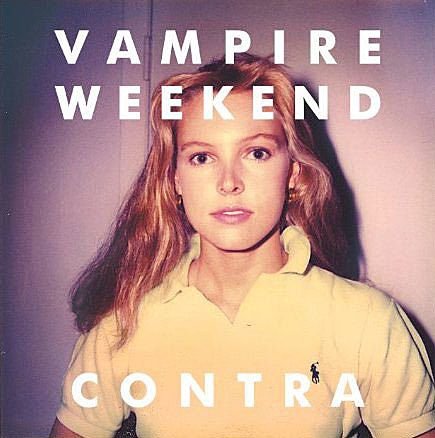At War With These Cultural Vampires
Vanity Fair is running this story on the 52-year old model that adorned the cover of Vampire Weekend’s critically praised Contra this year - although she’s a fresh-faced, confident-looking twenty-something in the Polaroid.
What the article can lack in solid answers - it’s a cascade of unreliable narrators and the anonymous, angry blogs that document their lives - it makes up for in terms of food for thought.
My $0.02:
- I think that’s a great cover, the Contra one. Stridently preppy, it shows the group making light of their image and aggravating their detractors. A lot of critics mounted the attack on Vampire Weekend around their being “fake”, “superficial”, “rich”, “Ivy League”, etc…most of this is contestable or at best elicits a shrug of the shoulders and a “so what?” Of course the band sound overeducated and write about a privileged and class-conscious world. So did Evelyn Waugh, and last I checked it wasn’t fashionable to hate him. Besides, this is a lot less vulgar than the sound of the Arctic Monkeys slurring in thick accents (”ain’t never heard of the Internet”) circa their sudden, contrived rise. Would we like it more if all these dudes pretended to be skint?
I digress - the point is Vampire Weekend don’t need to get defensive and make these arguments. One of the best ways to deflate a label is to wear it as a badge of pride, or at least a point of difference. This is what the Contra sleeve did, backed up by a solid sophomore effort. It showed they were bloody clever.
- But, god, I thought that was a Polaroid from 2009 when I first saw it, not 1983. If it shows one thing, it’s that the fashion of wealthy Americans apparently never changes. Not to be sullied by the tacky fads of the strip mall, an endless, sterile Lacoste-cum-Midwich Cuckoos summer.
- The meat of the article is fascinating, and the thesis statement (that in the 1980s, image was still something you could hold a proprietary and monetary interest in, and those notions are gone today) is an interesting but flawed one.
I think the model absolutely deserves something. And that may be swayed by the nature of how the thing played out. Vampire Weekend bought her picture from Tod Brody, a man who the circumstantial Internet evidence makes out to be a bit of a creep, for $5,000. Aggravating this is a release form that appears to stink to high heaven, from the anachronistic 80s stage name Ann Kennis allegedly signed with, to the utterly nominal sum the picture was released for. Together, this suggests that those involved have been a mixture of deceitful and plain lazy - it would have been reasonably straightforward to track Kennis down, and going to the trouble of forging her signature just looks like extraordinarily bad faith.
- So ought everyone who takes a photo and goes on to use it publicly shell out a la the 1980s, when cover and carton girls alike commanded big fees? That’s like saying all my talented photographer friends should be budgeting per subject of every portrait, and I don’t like that idea a jot (though it’s probably ethical to fully appraise them of what you’re hoping to do with the image, and do something to recognise their integral contribution to your work). There’s a distinction to be made between art and commercial gain.
And I can’t make it. Vampire Weekend released an LP with a fine congruence of subject matter and packaging. It’s a piece of art (hate it or love it), but it’s also a commercial product, straight up. VW recently crested the one million mark for physical units sold in a lifetime (that’s since 2008) - they’re one of the few remaining bighitters. And if people both critical and peripheral to their success are already making an okay living off this, why shouldn’t Kennis get anything?
And that’s where Vanity Fair and I part ways. I think the generation gap is present to an extent, but giving away your image for next-to-nothing isn’t new. There’ve always been fans and friends of starving young bands who been gracious and courageous enough to donate their looks (this girl certainly didn’t get paid $2 million US. She wouldn’t have even got $5,000). But once there’s plenty of money floating around to reward someone, it seems positively churlish. Factor in a little expedient fraud, and it’s positively unpleasant.

